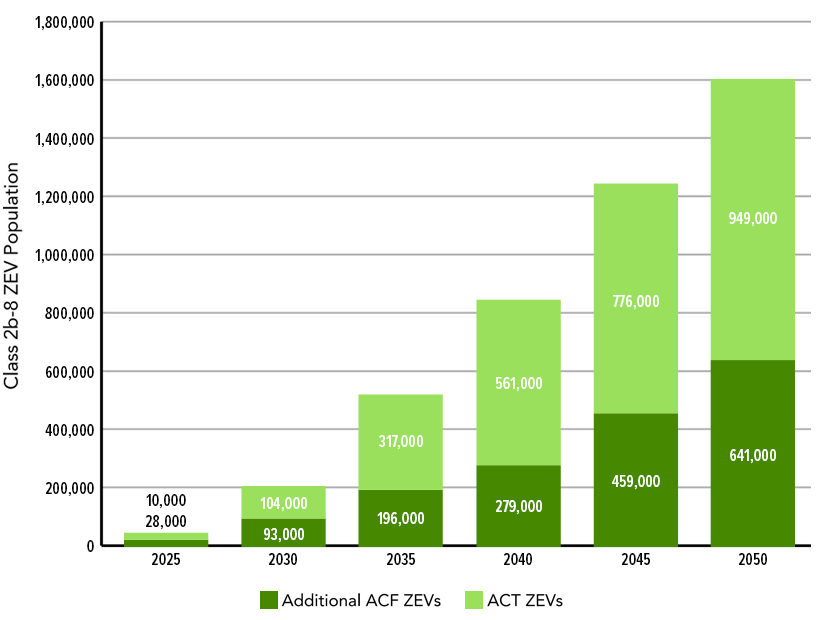
As the California Air Resources Board moves closer to adopting a regulation requiring truck fleets to transition to zero-emission vehicles, the agency is looking at how to handle situations where supporting infrastructure is not available.
The CARB board held a hearing on the regulation, known as Advanced Clean Fleets (ACF), in October. The regulation is expected to return to the board for final adoption this spring.
The proposed regulation covers three types of fleets: drayage trucks; state and local government fleets; and federal and high priority fleets, defined as fleets of 50 or more trucks or owned by a business with $50 million or more in annual revenue.
The regulation would require new trucks added to drayage and high priority fleets to be zero emission starting in January 2024. For state and local fleets, half of new trucks could be gas-powered until January 2027, at which time all fleet additions would need to be zero emission.
But CARB recognizes that some fleet operators might not be able to acquire the new ZEVs on schedule — or have infrastructure in place to charge them — due to factors beyond their control.
“If the infrastructure is not available, it doesn’t matter how many vehicles we have in our parking lot,” CARB Vice Chair Sandra Berg said during an ACF workshop this month. “Likewise, if the vehicles aren’t available, it doesn’t matter how many we can plug in at the facility.”
CARB held the workshop to discuss expanding exemptions to ACF when vehicles or infrastructure aren’t available.
In cases where a ZEV is not commercially available in the configuration needed, the draft regulation would allow a fleet operator to buy a gas-powered vehicle instead. If a ZEV is ordered a year ahead of the compliance deadline but delivery is delayed, the operator can keep using their internal combustion vehicle until the ZEV arrives.
On the infrastructure side, a compliance extension of up to two years would be offered in cases where there’s a construction delay. That might be a change in general contractor, unexpected safety issues, or a shipping delay for the zero-emission charging or fueling equipment.
The two-year extension is an increase from the previously proposed one year. The extension would be available if construction started at least a year before the compliance deadline.
Utility Delays Considered
And in a new proposal discussed during this month’s workshop, a compliance extension of up to five years could be granted if a contract has been signed with a utility to power the infrastructure, but the utility needs more time to finish the job. The provision would apply to power needed for electric charging or, in the case of hydrogen fuel cell vehicles, electrolyzers to produce the hydrogen.
Another new proposal from CARB is to post online details on granted extensions, such as the reason for the extension and its length, the city where the fleet is located, and the number of ZEVs involved.
Some workshop participants said CARB should allow compliance extensions in a wider variety of situations. One example is when infrastructure installation is delayed due to prolonged negotiations with a landlord over site improvements. Delays due to California Environmental Quality Act issues was another example.
Others said there should be no time limit on the exemptions.
“The infrastructure exemption should last as long as needed. What happens if you hardwire-in two years into the rule and it doesn’t happen?” said Jon Costantino, a consultant representing the California Council for Environmental and Economic Balance. “There needs to be an opportunity to deal with … the outliers.”
But “we can’t have an open-ended process of extensions,” Berg said.
“We have to put the marker in the sand,” she said. “It has to be clear. It has to be enforceable. And it has to have provisions for flexibility that work within the guidelines.”
Speeding the ZEV Transition
Advanced Clean Fleets is a complement to CARB’s Advanced Clean Trucks regulation, adopted in 2020, which requires manufacturers of medium- and heavy-duty trucks to sell an increasing percentage of zero-emission vehicles starting in 2024.
Several other states, including Washington, Oregon, Massachusetts, New Jersey, New York and Vermont, have adopted an Advanced Clean Trucks regulation, and other states are considering doing so.
ACF tackles the ZEV transition from a different angle, targeting truck fleets that could transition to zero-emission vehicles relatively soon, the agency said.
“The proposed ACF regulation attempts to strike a balance between moving the market quickly to ZE while recognizing fleets more suited for electrification should lead the way for smaller fleets,” CARB said in its initial statement of reasons for the rule.
The proposed ACF regulation would require all medium- and heavy-duty trucks sold in the state to be zero-emission starting in 2040, and all drayage trucks to be ZEVs by 2035.
At the Oct. 27 hearing on ACF, CARB board members asked staff to fine-tune the regulation, including changes to better address delays in availability of ZEVs or charging infrastructure.
Since then, the agency has held a series of workshops on proposed modifications. Another workshop is scheduled for Feb. 13.
CARB then plans to release a package of changes to the proposed regulation for a 15-day comment period before ACF goes to the board for final approval.
